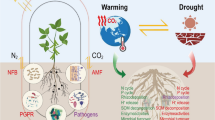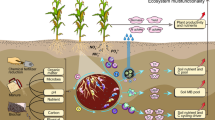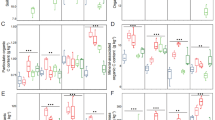Abstract
Aims
The interactions between aboveground and belowground biota are crucial for determining plant community composition and the response of ecosystem stability to climate change, but how warming and drought further impact plant performance and plant competition during plant-soil feedback (PSF) remains unclear.
Methods
We investigated the impact of soil community compositions and root traits on the PSF and plant competition. We used two types of plants: Leymus chinensis (perennial and dominant), and Kalimeris integrifolia (annual and subordinate) subjected to warming and drought in both monoculture and competitive conditions. Soil bacterial and fungal community compositions, aboveground biomass, and plant root functional traits were assessed.
Results
We found that in most cases, L. chinensis remained the dominant position in interspecific competition due to its stronger root system and other aspects. However, K. integrifolia exhibited higher competitiveness after plant-soil feedback, particularly in soil that had been conditioned by K. integrifolia. Our path analysis results indicate that warming had an impact on the PSF and plant competitiveness by negatively influencing the soil bacterial community composition and positively influencing the soil fungal community composition rather than affecting plant root traits. Drought did not affect the PSF and plant competitiveness via affecting soil microbial community and plant root traits.
Conclusions
Our findings indicated that soil microbial communities may have a greater impact on the PSF under climate change. Our study also highlights the mechanisms by which climate change alters the PSF and the structure of plant communities by altering the interactions between plant and soil microorganisms.





Similar content being viewed by others
Data availability
The datasets that support this study are available from the corresponding author on reasonable request.
References
Asefa M, Worthy SJ, Cao M, Song X, Lozano YM, Yang J (2022) Above- and below-ground plant traits are not consistent in response to drought and competition treatments. Ann Bot 130:939–950. https://doi.org/10.1093/aob/mcac108
Bardgett RD, Mommer L, de Vries FT (2014) Going underground: root traits as drivers of ecosystem processes. Trends Ecol Evol 29:692–699. https://doi.org/10.1016/j.tree.2014.10.006
Baxendale C, Orwin KH, Poly F, Pommier T, Bardgett RD (2014) Are plant-soil feedback responses explained by plant traits? New Phytol 204:408–423. https://doi.org/10.1111/nph.12915
Bennett JA, Klironomos J (2019) Mechanisms of plant-soil feedback: interactions among biotic and abiotic drivers. New Phytol 222:91–96. https://doi.org/10.1111/nph.15603
Berg MP, Kiers ET, Driessen G, van der Heijden M, Kooi BW, Kuenen F, Liefting M, Verhoef HA, Ellers J (2010) Adapt or disperse: understanding species persistence in a changing world. Global Change Biol 16:587–598. https://doi.org/10.1111/j.1365-2486.2009.02014.x
Bever JD, Dickie IA, Facelli E, Facelli JM, Klironomos J, Moora M, Rillig MC, Stock WD, Tibbett M, Zobel M (2010) Rooting theories of plant community ecology in microbial interactions. Trends Ecol Evol 25:468–478. https://doi.org/10.1016/j.tree.2010.05.004
Brinkman EP, Van der Putten WH, Bakker EJ, Verhoeven KJF (2010) Plant-soil feedback: experimental approaches, statistical analyses and ecological interpretations. J Ecol 98:1063–1073. https://doi.org/10.1111/j.1365-2745.2010.01695.x
Brundrett MC (2002) Coevolution of roots and mycorrhizas of land plants. New Phytol 154:275–304. https://doi.org/10.1046/j.1469-8137.2002.00397.x
Callaway RM, Brooker RW, Choler P, Kikvidze Z, Lortie CJ, Michalet R, Paolini L, Pugnaire FI, Newingham B, Aschehoug ET, Armas C, Kikodze D, Cook BJ (2002) Positive interactions among alpine plants increase with stress. Nature 417:844–848. https://doi.org/10.1038/nature00812
Casper BB, Castelli JP (2007) Evaluating plant-soil feedback together with competition in a serpentine grassland. Ecol Lett 10:394–400. https://doi.org/10.1111/j.1461-0248.2007.01030.x
Cavagnaro TR (2016) Soil moisture legacy effects: Impacts on soil nutrients, plants and mycorrhizal responsiveness. Soil Biol Biochem 95:173–179. https://doi.org/10.1016/j.soilbio.2015.12.016
Chen SY, Huang X, Yan XQ, Liang Y, Wang YZ, Li XF, Peng XJ, Ma XY, Zhang LX, Cai YY, Ma T, Cheng LQ, Qi DM, Zheng HJ, Yang XH, Li XX, Liu GS (2013) Transcriptome analysis in sheepgrass (Leymus chinensis): A dominant perennial grass of the Eurasian Steppe. PLoS ONE 8:15. https://doi.org/10.1371/journal.pone.0067974
Cheng XR, Huang MB, Shao MG, Warrington DN (2009) A comparison of fine root distribution and water consumption of mature Caragana korshinkii Kom grown in two soils in a semiarid region, China. Plant Soil 315:149–161. https://doi.org/10.1007/s11104-008-9739-5
Comas LH, Mueller KE, Taylor LL, Midford PE, Callahan HS, Beerling DJ (2012) Evolutionary patterns and biogeochemical significance of angiosperm root traits. Int J Plant Sci 173:584–595. https://doi.org/10.1086/665823
Comas LH, Becker SR, Cruz VV, Byrne PF, Dierig DA (2013) Root traits contributing to plant productivity under drought. Front Plant Sci 4:16. https://doi.org/10.3389/fpls.2013.00442
de Vries FT, Brown C, Stevens CJ (2016) Grassland species root response to drought: consequences for soil carbon and nitrogen availability. Plant Soil 409:297–312. https://doi.org/10.1007/s11104-016-2964-4
Debinski DM, Wickham H, Kindscher K, Caruthers JC, Germino M (2010) Montane meadow change during drought varies with background hydrologic regime and plant functional group. Ecology 91:1672–1681. https://doi.org/10.1890/09-0567.1
Denef K, Six J, Bossuyt H, Frey SD, Elliott ET, Merckx R, Paustian K (2001) Influence of dry-wet cycles on the interrelationship between aggregate, particulate organic matter, and microbial community dynamics. Soil Biol Biochem 33:1599–1611. https://doi.org/10.1016/S0038-0717(01)00076-1
Deveautour C, Donn S, Power SA, Bennett AE, Powell JR (2018) Experimentally altered rainfall regimes and host root traits affect grassland arbuscular mycorrhizal fungal communities. Mol Ecol 27:2152–2163. https://doi.org/10.1111/mec.14536
Diez JM, D’Antonio CM, Dukes JS, Grosholz ED, Olden JD, Sorte CJB, Blumenthal DM, Bradley BA, Early R, Ibanez I, Jones SJ, Lawler JJ, Miller LP (2012) Will extreme climatic events facilitate biological invasions? Front Ecol Environ 10:249–257. https://doi.org/10.1890/110137
Fort F, Cruz P, Catrice O, Delbrut A, Luzarreta M, Stroia C, Jouany C (2015) Root functional trait syndromes and plasticity drive the ability of grassland Fabaceae to tolerate water and phosphorus shortage. Environ Exp Bot 110:62–72. https://doi.org/10.1016/j.envexpbot.2014.09.007
Gardes M, Bruns TD (1993) Its primers with enhanced specificity for Basidiomycetes - application to the identification of mycorrhizae and rusts. Mol Ecol 2:113–118. https://doi.org/10.1111/j.1365-294X.1993.tb00005.x
Guo QX, Yan LJ, Korpelainen H, Niinemets U, Li CY (2019) Plant-plant interactions and N fertilization shape soil bacterial and fungal communities. Soil Biol Biochem 128:127–138. https://doi.org/10.1016/j.soilbio.2018.10.018
Hoover DL, Knapp AK, Smith MD (2014) Resistance and resilience of a grassland ecosystem to climate extremes. Ecology 95:2646–2656. https://doi.org/10.1890/13-2186.1
Inderjit, van der Putten WH (2010) Impacts of soil microbial communities on exotic plant invasions. Trends Ecol Evol 25: 512-519https://doi.org/10.1016/j.tree.2010.06.006
IPCC (2014) Climate change 2014: synthesis report. Contribution of working groups I, II, and III to the fifth assessment report of the intergovernmental panel on climate change (Core Writing Team, R. K. Pachauri, & L. A. Meyer, Eds.). Available at: https://www.ipcc.ch/report/ar5/syr/
Jing JY, Bezemer TM, van der Putten WH (2015) Interspecific competition of early successional plant species in ex-arable fields as influenced by plant-soil feedback. Basic Appl Ecol 16:112–119. https://doi.org/10.1016/j.baae.2015.01.001
Kaisermann A, de Vries FT, Griffiths RI, Bardgett RD (2017) Legacy effects of drought on plant-soil feedbacks and plant-plant interactions. New Phytol 215:1413–1424. https://doi.org/10.1111/nph.14661
Kardol P, Bezemer TM, van der Putten WH (2006) Temporal variation in plant-soil feedback controls succession. Ecol Lett 9:1080–1088. https://doi.org/10.1111/j.1461-0248.2006.00953.x
Kardol P, Cornips NJ, van Kempen MML, Bakx-Schotman JMT, van der Putten WH (2007) Microbe-mediated plant-soil feedback causes historical contingency effects in plant community assembly. Ecol Monogr 77:147–162. https://doi.org/10.1890/06-0502
Klanderud K (2005) Climate change effects on species interactions in an alpine plant community. J Ecol 93:127–137. https://doi.org/10.1111/j.1365-2745.2004.00944.x
Koerner SE, Collins SL (2014) Interactive effects of grazing, drought, and fire on grassland plant communities in North America and South Africa. Ecology 95:98–109. https://doi.org/10.1890/13-0526.1
Levine JM, Pachepsky E, Kendall BE, Yelenik SG, HilleRisLambers J (2006) Plant-soil feedbacks and invasive spread. Ecol Letters 9:1005–1014. https://doi.org/10.1111/j.1461-0248.2006.00949.x
Liu D, Estiarte M, Ogaya R, Yang X, Peñuelas J (2017) Shift in community structure in an early-successional Mediterranean shrubland driven by long-term experimental warming and drought and natural extreme droughts. Global Change Biol 23:4267–4279. https://doi.org/10.1111/gcb.13763
Lozano YM, Aguilar-Trigueros CA, Flaig IC, Rillig MC (2020) Root trait responses to drought are more heterogeneous than leaf trait responses. Funct Ecol 34:2224–2235. https://doi.org/10.1111/1365-2435.13656
Lozupone C, Knight R (2005) UniFrac: a new phylogenetic method for comparing microbial communities. Appl Environ Microbiol 71:8228–8235. https://doi.org/10.1128/AEM.71.12.8228-8235.2005
Lozupone CA, Hamady M, Kelley ST, Knight R (2007) Quantitative and qualitative beta diversity measures lead to different insights into factors that structure microbial communities. Appl Environ Microbiol 73:1576–1585. https://doi.org/10.1128/AEM.01996-06
Mangan SA, Schnitzer SA, Herre EA, Mack KML, Valencia MC, Sanchez EI, Bever JD (2010) Negative plant-soil feedback predicts tree-species relative abundance in a tropical forest. Nature 466:752-U710. https://doi.org/10.1038/nature09273
Mori H, Maruyama F, Kato H, Toyoda A, Dozono A, Ohtsubo Y, Nagata Y, Fujiyama A, Tsuda M, Kurokawa K (2014) Design and experimental application of a novel non-degenerate universal primer set that amplifies prokaryotic 16S rRNA genes with a low possibility to amplify eukaryotic rRNA genes. DNA Res 21:217–227. https://doi.org/10.1093/dnares/dst052
Mueller KE, LeCain DR, McCormack ML, Pendall E, Carlson M, Blumenthal DM (2018) Root responses to elevated CO2, warming and irrigation in a semi-arid grassland: Integrating biomass, length and life span in a 5-year field experiment. J Ecol 106:2176–2189. https://doi.org/10.1111/1365-2745.12993
Oksanen J, Blanchet GF, Friendly M, Kindt R, Legendre P, McGlinn D, Minchin PR, O'Hara RB, Simpson GL, Solymos P, Henry M, Stevens H, Szoecs E, Wagner H (2017) Vegan: community ecology package. R package.
Packer A, Clay K (2000) Soil pathogens and spatial patterns of seedling mortality in a temperate tree. Nat 404:278–281. https://doi.org/10.1038/35005072
Parmesan C, Yohe G (2003) A globally coherent fingerprint of climate change impacts across natural systems. Nature 421:37–42. https://doi.org/10.1038/nature01286
Preece C, Penuelas J (2016) Rhizodeposition under drought and consequences for soil communities and ecosystem resilience. Plant Soil 409:1–17. https://doi.org/10.1007/s11104-016-3090-z
Ramette A (2007) Multivariate analyses in microbial ecology. FEMS Microbiol Ecol 62:142–160. https://doi.org/10.1111/j.1574-6941.2007.00375.x
Rasmussen PU, Hugerth LW, Blanchet FG, Andersson AF, Lindahl BD, Tack AJM (2018) Multiscale patterns and drivers of arbuscular mycorrhizal fungal communities in the roots and root-associated soil of a wild perennial herb. New Phytol 220:1248–1261. https://doi.org/10.1111/nph.15088
Rasmussen PU, Bennett AE, Tack AJM (2020) The impact of elevated temperature and drought on the ecology and evolution of plant-soil microbe interactions. J Ecol 108:337–352. https://doi.org/10.1111/1365-2745.13292
Reynolds HL, Packer A, Bever JD, Clay K (2003) Grassroots ecology: Plant-microbe-soil interactions as drivers of plant community structure and dynamics. Ecology 84:2281–2291. https://doi.org/10.1890/02-0298
Robertson TR, Zak JC, Tissue DT (2010) Precipitation magnitude and timing differentially affect species richness and plant density in the sotol grassland of the Chihuahuan Desert. Oecologia 162:185–197. https://doi.org/10.1007/s00442-009-1449-z
Ruamps LS, Nunan N, Chenu C (2011) Microbial biogeography at the soil pore scale. Soil Biol Biochem 43:280–286. https://doi.org/10.1016/j.soilbio.2010.10.010
Semchenko M, Leff JW, Lozano YM, Saar S, Davison J, Wilkinson A, Jackson BG, Pritchard WJ, De Long JR, Oakley S, Mason KE, Ostle NJ, Baggs EM, Johnson D, Fierer N, Bardgett RD (2018) Fungal diversity regulates plant-soil feedbacks in temperate grassland. Sci Adv 4:9. https://doi.org/10.1126/sciadv.aau4578
Smith MD, Knapp AK, Collins SL (2009) A framework for assessing ecosystem dynamics in response to chronic resource alterations induced by global change. Ecology 90:3279–3289. https://doi.org/10.1890/08-1815.1
Spitzer CM, Wardle DA, Lindahl BD, Sundqvist MK, Gundale MJ, Fanin N, Kardol P (2021) Root traits and soil micro-organisms as drivers of plant-soil feedbacks within the sub-arctic tundra meadow. J Ecol 110:466–478. https://doi.org/10.1111/1365-2745.13814
Tedersoo L, Bahram M, Põlme S, Kõljalg U et al (2014) Global diversity and geography of soil fungi. Sci 346. https://doi.org/10.1126/science.1256688
van de Voorde TFJ, van der Putten WH, Bezemer TM (2011) Intra- and interspecific plant-soil interactions, soil legacies and priority effects during old-field succession. J Ecol 99:945–953. https://doi.org/10.1111/j.1365-2745.2011.01815.x
van der Heijden MGA (2008) The unseen majority: Soil microbes as drivers of plant diversity and productivity in terrestrial ecosystems. Ecol Lett 11:651–651. https://doi.org/10.1111/j.1461-0248.2008.01199.x
van der Putten WH, Peters BAM (1997) How soil-borne pathogens may affect plant competition. Ecol 78:1785–1795. https://doi.org/10.1890/0012-9658(1997)078[1785:HSBPMA]2.0.CO;2
van der Putten WH, Vandijk C, Peters BAM (1993) Plant-specific soil-borne diseases contribute to succession in foredune vegetation. Nature 362:53–56. https://doi.org/10.1038/362053a0
van der Putten WH, Bardgett RD, Bever JD, Bezemer TM, Casper BB, Fukami T, Kardol P, Klironomos JN, Kulmatiski A, Schweitzer JA, Suding KN, Van de Voorde TFJ, Wardle DA (2013) Plant-soil feedbacks: the past, the present and future challenges. J Ecol 101:265–276. https://doi.org/10.1111/1365-2745.12054
van der Putten WH, Bradford MA, Brinkman EP, van de Voorde TFJ, Veen GF (2016) Where, when and how plant-soil feedback matters in a changing world. Funct Ecol 30:1109–1121. https://doi.org/10.1111/1365-2435.12657
Wang D, Ba L (2008) Ecology of meadow steppe in northeast China. Rangeland J 30:247–254. https://doi.org/10.1071/RJ08005
Wang RZ, Chen L, Bai YG, Xiao CW (2008) Seasonal dynamics in resource partitioning to growth and storage in response to drought in a perennial rhizomatous grass, Leymus chinensis. J Plant Growth Regul 27:39–48. https://doi.org/10.1007/s00344-007-9029-0
Wellstein C, Poschlod P, Gohlk A, Chelli S, Campetella G, Rosbakh S, Canullo R, Kreyling J, Jentsch A, Beierkuhnlein C (2017) Effects of extreme drought on specific leaf area of grassland species: A meta-analysis of experimental studies in temperate and sub-Mediterranean systems. Global Change Biol 23:2473–2481. https://doi.org/10.1111/gcb.13662
Weltzin JF, Bridgham SD, Pastor J, Chen JQ, Harth C (2003) Potential effects of warming and drying on peatland plant community composition. Global Change Biol 9:141–151. https://doi.org/10.1046/j.1365-2486.2003.00571.x
White JR, Nagarajan N, Pop M (2009) Statistical methods for detecting differentially abundant features in clinical metagenomic samples. PLoS Comput Biol 5:11. https://doi.org/10.1371/journal.pcbi.1000352
White TJ, Bruns T, Lee S, Taylor J (1990) Amplification and direct sequencing of fungal ribosomal RNA genes for phylogenetics. In: Ln lnnis MA, Gelfand DH, Sninsky JJ, White TJ (ed) PCR protocols: a guide to methods and applications. Academic Press, New York, pp 315–322
Wolfe BE, Klironomos JN (2005) Breaking new ground: Soil communities and exotic plant invasion. Bioscience 55:477–487. https://doi.org/10.1641/0006-3568(2005)055[0477:BNGSCA]2.0.CO;2
Yang YF, Wang SZ, Li JD (2003) Development and age structure of ramets of Kalimeris integrifolia populations in the Songnen Plains, Northeast China. Acta Bot Sin 45:158–163
Yang X, Guo R, Knops JMH, Mei LL, Kang FR, Zhang T, Guo JX (2020) Shifts in plant phenology induced by environmental changes are small relative to annual phenological variation. Agric for Meteorol 294:10. https://doi.org/10.1016/j.agrformet.2020.108144
Yang X, Mariotte P, Guo J, Hautier Y, Zhang T (2021) Suppression of arbuscular mycorrhizal fungi decreases the temporal stability of community productivity under elevated temperature and nitrogen addition in a temperate meadow. Sci Total Environ 762:143137. https://doi.org/10.1016/j.scitotenv.2020.143137
Zhai JF, Dong YY, Sun YP, Wang Q, Wang N, Wang FW, Liu WC, Li XW, Chen H, Yao N, Guan LL, Chen K, Cui XY, Yang MY, Li HY (2014) Discovery and analysis of microRNAs in Leymus chinensis under saline-alkali and drought stress using high-throughput sequencing. PLoS ONE 9:10. https://doi.org/10.1371/journal.pone.0105417
Zheng Z, Bai W, Zhang WH (2019) Root trait-mediated belowground competition and community composition of a temperate steppe under nitrogen enrichment. Plant Soil 437:341–354. https://doi.org/10.1007/s11104-019-03989-z
Zhou GY, Zhou XH, Nie YY, Bai SH, Zhou LY, Shao JJ, Cheng WS, Wang JW, Hu FQ, Fu YL (2018) Drought-induced changes in root biomass largely result from altered root morphological traits: Evidence from a synthesis of global field trials. Plant Cell Environ 41:2589–2599. https://doi.org/10.1111/pce.13356
Zufferey V, Cochard H, Ameglio T, Spring JL, Viret O (2011) Diurnal cycles of embolism formation and repair in petioles of grapevine (Vitis vinifera cv. Chasselas). J Exp Bot 62:3885–3894. https://doi.org/10.1093/jxb/err081
Acknowledgements
This study was supported by the National Natural Science Foundation of China (32171645, 31770359) and the Foundation of Science and Technology Commission of Jilin Province (20200201115JC).
Author information
Authors and Affiliations
Corresponding authors
Ethics declarations
Conflict of interest
The authors declare no conflicts of interest.
Ethics approval and consent to participate
Not applicable.
Consent for publication
Not applicable.
Additional information
Responsible Editor: Ruowen Yang.
Publisher's Note
Springer Nature remains neutral with regard to jurisdictional claims in published maps and institutional affiliations.
Supplementary Information
Below is the link to the electronic supplementary material.
Rights and permissions
Springer Nature or its licensor (e.g. a society or other partner) holds exclusive rights to this article under a publishing agreement with the author(s) or other rightsholder(s); author self-archiving of the accepted manuscript version of this article is solely governed by the terms of such publishing agreement and applicable law.
About this article
Cite this article
Chu, Q., Feng, W., Tian, Y. et al. Soil microbial community contributes more to plant-soil feedback and plant-plant interactions than root traits under warming and drought. Plant Soil (2024). https://doi.org/10.1007/s11104-024-06606-w
Received:
Accepted:
Published:
DOI: https://doi.org/10.1007/s11104-024-06606-w




